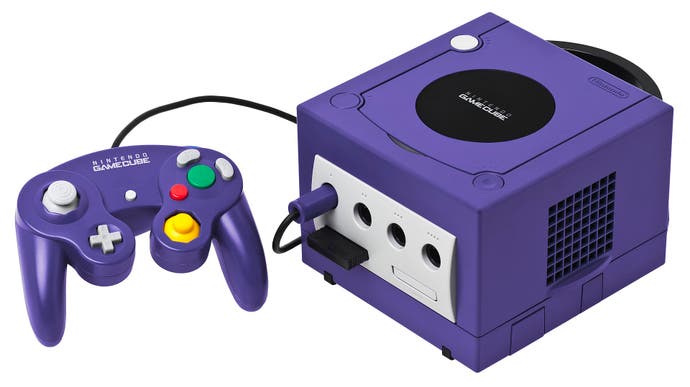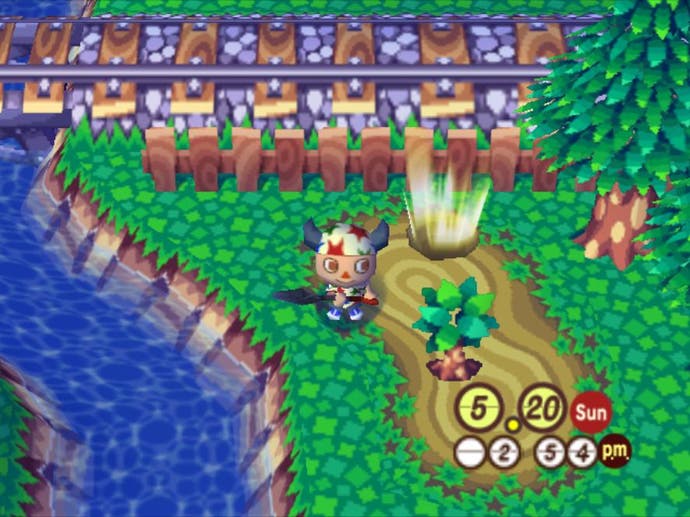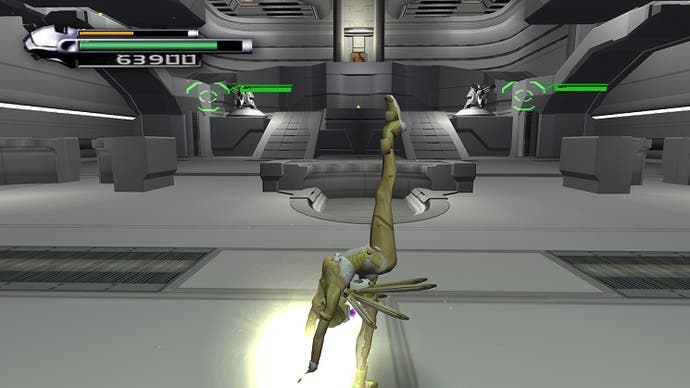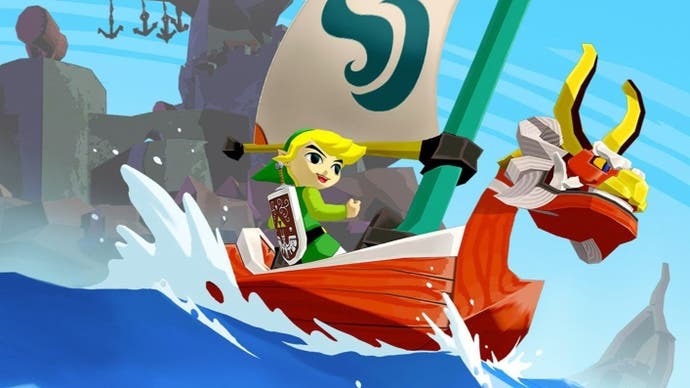The GameCube at 20: remembering the invigorating boundaries of Nintendo's magic box
M...m...m...mario...?
My first GameCube didn't work. When I picked it up from the store and brought it home, when I sorted out the wires and plugged it in and turned it on? It just sat there and did nothing. Actually, okay, it did one thing: it made a swift clicking noise, as if there was clockwork inside it and the clockwork was broken but still spinning and chugging anyway. This broken thing had personality; it was a stubborn box. I took it back and got a replacement and that one worked fine, but I still think of that first GameCube of mine, the clockwork GameCube that couldn't be a GameCube, but that still seemed to want to be something at least.
Probably in part because of that, I've thought about the inside of the GameCube much more than the inside of any other console. The unseen wonders! What's in there, what manner of energy flocks and shivers over this secret landscape that we never generally get to witness, but which allows such beautiful, magical things to happen on the screen?
I tend to think that the GameCube prompted these kinds of questions even if yours didn't happen to make a sound like broken clockwork. It prompted them purely because of that audacious shape: a little jewellery box, not quite a cube, sure - you would need the GBA adapter fitted underneath to live that precise dream - but still far removed from the Robocop skyscraper of the PS2 or the Giger VCR of the first Xbox. What's inside? Never has a games console been so beautifully, assuredly self-contained. Everything fits inside this, the GameCube says. And there's even a handle to carry it about with! Surprised?
Oh the handle. But I will get to that. Here is the thing about the GameCube for me. Sure, it had a port for the internet. Sure, there were games you could play over the internet on it. And some of them were brilliant. Sure, all this generation of consoles was getting ready for the internet in some way or another, or getting ready for a connected world of some kind, even if the form it often took for Nintendo generally didn't involve the internet at all and was instead a couple of GBAs tethered by special cables and playing asymmetric Pac-Man. But in terms of how I feel about it - how I feel about that classic purple box? The GameCube, in its modest, self-contained way, will always be the last offline console to me. More than anything, that's how I remember it, and that's the special place it holds in my head. The last console that was a mysterious series of places in its own right - places with firm boundaries.
It seems weird, I think, to define a console like this by a limitation - particularly a limitation it didn't truly have. But when I think of the GameCube, the games all have that same magical power that the console seemed to exude: you saw them on the screen and they were dazzling, but they lived inside the box and only inside the box. They were given to you whole, and complete, with no patches, no packets of updates shooting back and forth, no friend requests and status messages and no DLC and day-one installations. And if you wanted to share them with others? Well, you needed to grasp the GameCube by the handle and physically take it somewhere there were other people to share it with.

Animal Crossing encapsulates this feeling for me like almost nothing else. If ever a game was also a world in a bottle, a haunted fish tank, it's this one. A village, viewed from above, self-contained and driven by ritual, whimsy, and the tick of the GameCube's internal clock. A program so small I was once told it could be loaded and run with the disk removed. Animal Crossing was about community, sure - Martin once told me he always thinks of it as an MMO - but strangers visited on their own memory units that had to be physically slotted into the machine. They turned up with luggage - as luggage, really. Elsewhere, new items were loaded in by scanning little slips of glossy card, but all that meant was that the items were secretly there already, jangling around in the gaslit pantry of Animal Crossing code. Animal Crossing sold me on the GameCube, and it's probably the last game I ever regularly played on it too. It was the spine of my GameCube career and the brightest point of my GameCube memories.

Perhaps not the absolute brightest. The first game I owned and the first game I completed on my own machine was Wind-Waker, and this again, for all its watery expansiveness, now seems a marvel of bounded realities. All Zelda games are things of rules and traditions and points at which further progress is impossible, but this one both seems to escape its confines - that huge blue ocean - while simultaneously reinforcing them, with a neat map that parcels islands up one per square. Its greatest moment - this can't be a spoiler anymore - still makes me catch my breath to think of it. You go down under the water, beneath that inscrutable, depthless blue, and there's Hyrule, its hills and castle, frozen in a bubble. It's a haunted landscape but also an oddly cozy one, because we, the player, know this perfect castle is twice contained - by the blue sea above and also the purple box. It's another trick landscape held within the cube - rather fitting really for a series that was inspired by its designer's desk drawers, each one, he fantasised, capable of holding its own garden.

This was my first Zelda in ages, I should add, and that will also be a personal part of the GameCube's charm to me. For me, the GameCube was a homecoming. I had been away from games through university - the odd all-nighter of Worms 2 or Mario Kart 64, a glimpse of Tomb Raider and Metal Gear Solid that left me pretty much flattened by the possibilities of proper 3D spaces. The machines always belonged to other people. But the GameCube I bought, and as I played its games, I learned about all modern games - how a horror game like Eternal Darkness could be weird and literary and passionately muddled, how a shooter (I thought it was a shooter) like Metroid could be so much more than a shooter could ever realistically hope to be, how PN03 could make such crushing restrictions on the player and the colour palette into a thing of expressive joy. Billy Hatcher, Mario Sunshine! This article is not a catalogue of classics, but in listing these games I see now something peculiar: while the GameCube kept these games contained within it, they individually seemed to push against the confines of their own genres, like paints muddling and mingling on the page, running together to create brilliant and unexpected new colours.
PN03! Billy Hatcher! GameCube games often gained a certain sense of walled-off identity because of the box they ran on, the box they ran inside. And this can keep certain games strongly rooted in their time and the space of the console they first came to, even if they move on elsewhere eventually. Googling it now, it turns out that Luigi's Mansion, a GameCube launch title, which is itself quite the power move, was ported to the 3DS a few years back. But look at it. Look at Luigi's Mansion with its mirrors and dust sheets and rattling vanities. It may not have drawn specific things out of the hardware like Mario 64 and that wonderfully odd controller, and it may not be a primer for everything the machine can do, like Yoshi's Touch 'n' Go or Wii Sports. But it is the GameCube in some fundamental way. Luigi reaches out with his gloved hand, in a close-up that still feels like a strange cinematic departure for a series like this, and he tries the door handle. It opens. Another room, filled with spirits and delights and secrets. And walls surrounding it, safely bounded in on all sides, complete.










